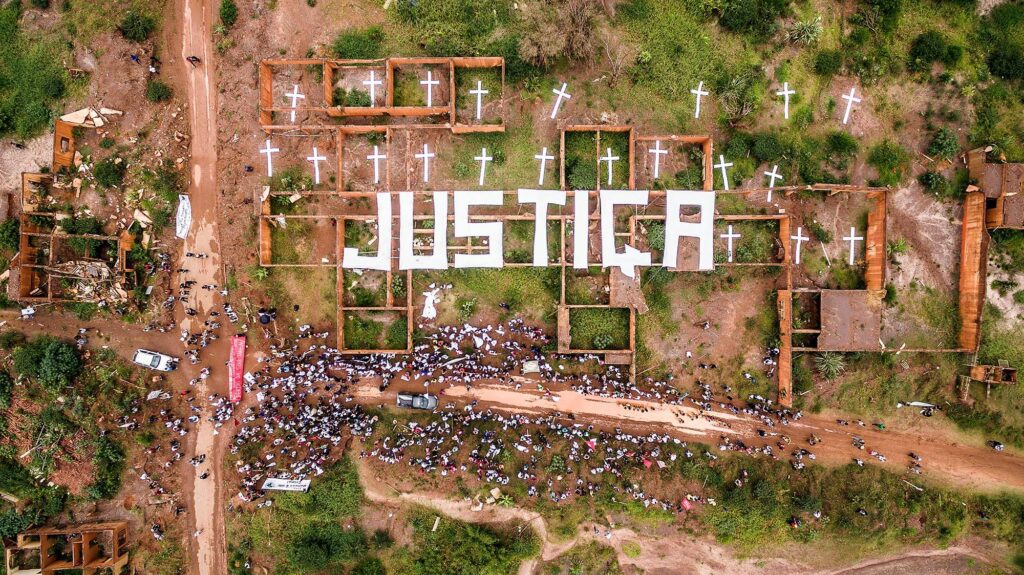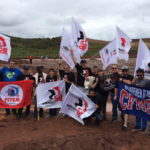Read this article in:
English
21 November, 2024The Brazilian justice system has cleared mining companies: Samarco Mineração, BHP and Vale of criminal charges relating to the environmental disaster near the city of Mariana in 2015. IndustriALL condemns the companies for manslaughter and environmental crimes and calls on them to take responsibility for the catastrophe.
The tailings dam run by Samarco, a company owned by BHP and Vale, collapsed on 5 November 2015 near Mariana, Minas Gerais, causing the largest environmental disaster in the country's history and killing 19 people.
Nine years later, the Ponte Nova branch of the Brazilian federal court has cleared defendants – the companies Samarco, Vale and BHP and 21 executives and technicians – in the criminal proceedings. According to the court, there was a lack of proof of individual actions that would determine direct criminal responsibility for the disaster.
“After a lengthy investigation the documents, reports and witnesses submitted as evidence failed to demonstrate that individual behaviours contributed directly and decisively to the collapse of the Fundão dam. In criminal proceedings, if there is any reasonable doubt – stemming from the evidence analyzed – the court must rule in favour of the defendants,”
judge, Patrícia Alencar, wrote in the preamble to her ruling, according to the Federal Justice Department’s Minas Gerais judicial section.
In her ruling, she underscored the importance of technical and scientific work in developing preventive strategies and stopping another tragedy. She also stated that there needed to be a focus on repairing the damage caused to communities. Although she recognized that even substantial financial compensation would not make up for the losses experienced by the victims and the environmental impact of the tragedy.
Although there was no criminal conviction, on 25 October 2024, the federal government signed the Mariana settlement agreement with the companies, who agreed to allocate billions of reais in resources to repair the damage caused by the Mariana tragedy.
Commenting on the agreement, IndustriALL vice president Lucineide Varjão said:
“Nine years on and this agreement has only been made possible thanks to the efforts of the government of President Luiz Inácio Lula da Silva. Unions and social movements will need to monitor compliance with the timelines and other provisions of the agreement reached with the union.”
According to the official Brazilian government website, the agreement provides for the payment of 132 billion reais including 100 billion reais that the companies involved in the tragedy will pay to the government over 20 years for various purposes. The companies will also set aside 32 billion reais to cover compensation for affected individuals and for other reparative actions that will remain under their responsibility. That comes in addition to the 38 billion reais they claim to have already paid.
In his speech at the signing of the settlement agreement, President Lula said:
“We are repairing the damage caused by a disaster that could have been avoided, but was not, out of irresponsibility and driven by profit. What happened in Mariana was pure and simple irresponsibility towards the people of the region. We might never be able to repair all the damage that people have suffered, because there is psychological damage too. In addition to the deaths, people have lost things they loved, that they will never see again and that cannot be replaced. That is why this is important, fellow ministers: we have a duty to start building a future for these people.”
IndustriALL assistant general secretary Kemal Özkan said:
“In recent years, IndustriALL visited Mariana to show solidarity, joining with local civil society allies to demand justice. Although it’s come late, we are pleased that justice has been achieved in the Mariana case. It is clear that strong political will can bring results. The companies must be held accountable. They must take responsibility, to prevent this from happening again in future.”


